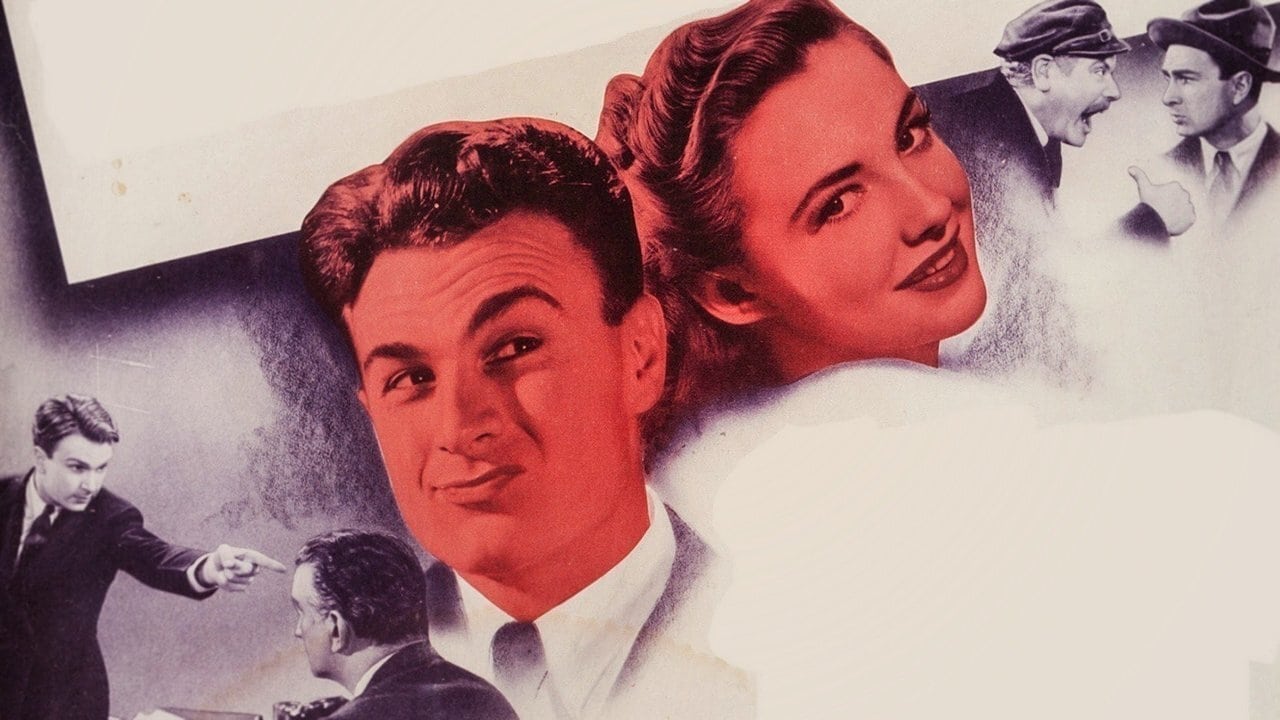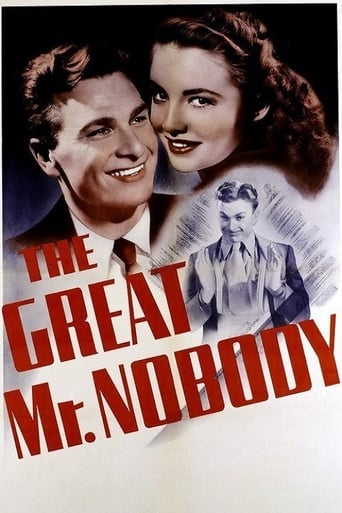jacobs-greenwood
Directed by Benjamin Stoloff, this unexpected gem features Eddie Albert in the title role. Known best for his supporting roles, and later nominated for two Oscars (Roman Holiday (1953) and The Heartbreak Kid (1972)), Albert is the lead in this one, which features several other career supporting actors who, somehow, were never recognized by the Academy of Motion Picture Arts & Sciences: Alan Hale, John Litel, Charles Trowbridge, Paul Hurst, John Ridgely, Douglas Kennedy, Billy Benedict, and even Joe Devlin and Charles Halton, who appear uncredited.One is reminded of James Stewart's "George Bailey" character, but only in the sense that one man could touch so many lives through his selfless choices. Unlike It's a Wonderful Life (1946) though, this film has no fantasy sequence nor does the protagonist ever come to regret his choices, preferring instead to remain anonymous for his sacrifices and expecting nothing else out of life except an opportunity to serve his fellow man.Robert Smith (Albert), called Dreamy by his encouraging, supporting, co-worker and girlfriend Mary (Joan Leslie), works in the classified ads department of one of the three competing newspapers in the city. He dreams of sailing away with his friend "Skipper" Martin (Hale), with whom he's saved just enough to do it. He gives his resignation letter, and the news, to Mary, who's disappointed but puts it on his boss John Wade's desk anyway. Smith picks up his friend in his dilapidated automobile which they've valued at $150, the last of what they need to finally own the Viking, the boat they've mortgaged. He takes the Skipper by his soon-to-former place of employment where Martin can't wait to tell off his cranky old soon- to-be ex-boss (Halton). Unfortunately, however, Smith forgets to set the parking brake and the two witness the car rolling off the dock and into the harbor. Since they can now no longer afford to quit, the Skipper has to swallow his pride and take yet another tongue lashing insult from his current taskmaster, while Smith rushes on foot to reclaim his resignation letter.On his way into the newspaper offices building, Smith runs into, and briefly greets "Limpy" Barnes (Dickie Moore), a disabled boy who sells papers outside its entrance. Upon learning from Mary that she'd put his letter on Wade's desk, he rushes into the office to interrupt his boss (Litel), who'd been having a drink of whiskey, just in time to retrieve the letter. We learn that Smith isn't thought of very highly by his boss, even though Dreamy thinks Wade, a former Major in the armed services, is "tops". Mary is happy that Dreamy isn't going anywhere too soon and the two go out on a date that evening. Their plans to go to a movie are interrupted when they witness a fire. When Smith sees a fire fighter, who'd already rescued several children, fall down, he rushes into the burning building to save him. However, it's the fireman who carries the overcome Smith out and places him on the sidewalk.The next day at the newspaper offices, a box is installed into which the employees are encouraged to submit circulation generation ideas for a possible (financial) bonus. Looking at the headlines of the paper in front of him, Smith (who gave the story to reporter Ridgely) comes up with an idea to recognize heroes, like the fireman O'Connor (Hurst), by giving them an award. Meanwhile, a new young attractive executive William Amesworth (William Lundigan), who happens to be a descendant from the paper's founder, is introduced around the offices by Grover Dillon (Trowbridge). He is instantly attracted to Mary, who works on the phone bank which receives the classified ads. When Wade reads Smith's idea, he adopts it as his own, telling Amesworth, who's naturally impressed. Wade then tells Smith that someone else had submitted the very same idea earlier, then gives his employee apparently the only "pat on the back" he ever has. While this seems to satisfy Dreamy just fine, Mary is upset that he's not willing to fight for his due credit. This happens twice more in the film. When Amesworth shows a public interest in Mary, Smith seems to finally recognize what he's got and, against the advice of the Skipper, who thinks all women are trouble, pledges his love to Mary.Another day, Smith sees a man take a paper from Limpy's stack without paying, and stops him. There's a brief scuffle and Smith's hat falls into the street. When Limpy goes to retrieve it, he's hit by a car. Smith makes sure Limpy is taken care of, eventually giving his apartment to Limpy and his family when, without his income while he recovered, they are evicted. This is the last straw for Skipper, who had tolerated delays in their sailing plans due to Smith's generosity, which prevented them from ever getting over the hump on what they owed on their boat. So, the Skipper leaves in a huff and rues the day he ever made plans with Smith. Meanwhile, Smith tells Mary she is better off without him, that he can't afford to take her out anymore. Though he doesn't tell her why, it's because he's selling everything he owns (including his car, to Devlin) to support Limpy's family, and even pay for an operation to "cure" his limp.Smith's selflessness continues until he crosses the line by helping the fired office boy (Benedict) get a new job from a yet to be printed want ad, though Smith makes sure the salesman (Kennedy) gets his commission by paying it out of his own pocket.This eventually leads to Wade firing Smith. But, never fear, with help from Mary, and the Skipper and O'Connor (sort of), a happy ending, if not tear-jerking like Frank Capra's film, is in order. In fact, the very end of the film is perfect for our Dreamy, given his character.
wes-connors
Hapless New York newspaper ad salesman Eddie Albert (as Robert "Dreamy" Smith) is finally going to fulfill his dream. He plans to quit work, buy a sailboat and head out for adventure at sea. After a mishap disposing of his automobile, Mr. Albert must cancel the trip. Pretty co-worker Joan Leslie (as Mary Clover) is happy, but jealous roommate Alan Hale (as "Skipper" Martin) thinks Albert should stop dating Ms. Leslie and save money for his share of their boat. Albert gets into more money problems when he decides to help partially crippled paperboy Dickie Moore (as "Limpy" Barnes)...Hoping for a bonus at work, Albert comes up with ideas to boost the circulation of his newspaper, but sneaky John Litel (as John Wade) takes all the credit. Albert gets in more trouble for helping future "Bowery Boy" William "Billy" Benedict (as Jigs) get a job. As if that wasn't enough, handsome William Lundigan (as Richard Amesworth) moves in on Leslie..."The Great Mr. Nobody" is quite pleasant, with future "Green Acres" star Albert shining in a whimsical role. It's interesting to hear Mr. Hale being called "Skipper" throughout as he resembles son Alan Hale Jr., familiar as the Skipper on "Gilligan's Island" in the 1960s. However, this Hale acts differently (more like a stocky Robert Young). Hale Jr. patterned his skipper after Oliver Hardy. Also interesting is how much you Moore's crippled newsboy resembles "Captain Marvel Jr." from the best selling comic book introduced shortly after this film. The ending is weak, but certainly fit the times.****** The Great Mr. Nobody (2/15/41) Benjamin Stoloff ~ Eddie Albert, Alan Hale, Joan Leslie, Dickie Moore
David (Handlinghandel)
This probably never figured high in Eddie Albert's resume. Indeed, at first I almost skipped it: The opening scenes with "Skipper" Alan Hale are most unpromising.(All scenes involving him pull the movie down, in fact.) But it is a very sweet tale, once given a chance. Albert plays newspaper clerk Dreamy, who is far too kind and honorable for his own good. The well-being of his charming girlfriend Joan Leslie also suffers.He allows his boss to steal his ideas and take credit for them. He helps out any of the downtrodden. Figuring most noticeably in this category is Limpy, the lame newspaper boy, played by Dickie Moore. He and his family are recipients of great, selfless kindness by Dreamy.It has a happy ending, though not a typical Hollywood ending: After Dreamy has been recognized for the hero he is, he is given some news that thrills him. Indeed, it could be seen as good news. But his final line is funny,ironic, a bit off-kilter, and very touching.

